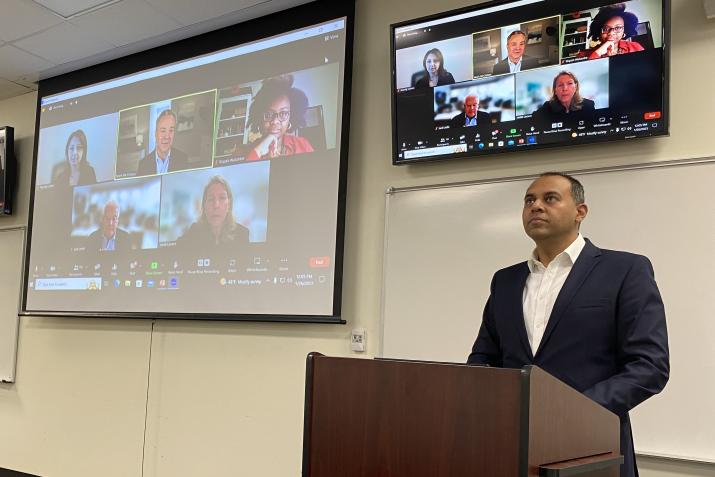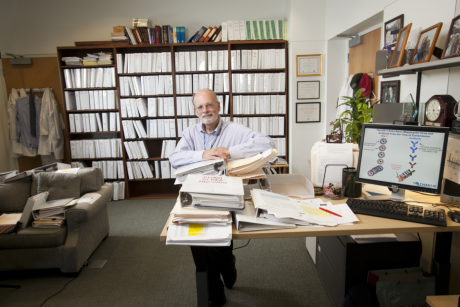
Krishna Udayakumar leads discussion of public trust in health officials during DGHI's Think Global event on Jan. 26.
Published January 30, 2023, last updated on March 15, 2023 under Around DGHI
When crises happen, leaders look to gather as much information as possible before speaking to the public. Mandy Cohen, M.D., found that approach impossible as the COVID-19 pandemic began in early 2020. At the time, she served as the secretary of the North Carolina Department of Health and Human Services.
“This was an evolving crisis [with] real-time learning,” says Cohen, who is now executive vice president of Aledade. “Our crisis response was going to hinge on whether we could build and maintain trust with the public.”
That proved difficult during the early days of the pandemic, when information and recommendations changed often. But the weakening of public trust in health leaders began decades earlier, noted several experts during a Duke Global Health Institute Think Global event on Jan. 26.
To reverse that trend, leaders need to establish transparency and equality with the communities they serve, panelists emphasized. Cohen noted how she participated in 170 press conferences to ensure the public had as much information as was known at the time.
“[You have to see] communities as key stakeholders,” said Dr. Rispah Walumbe, a health policy advisor at Amref Health Africa. “It’s critical to understand we have [many] players, but look at communities as a key player in the trust ecosystem.”
Watch the full discussion below, or scroll down for highlights.
ABOUT THE SPEAKERS
Krishna Udayakumar, M.D., (moderator) is the founding director of the Duke Global Health Innovation Center under DGHI. He is also an associate professor of global health and medicine at Duke and a core faculty member at the institute and Duke-Margolis Center for Health Policy.
Mandy Cohen, MD, is also chief executive officer of Aledade Care Solutions, the company’s health services unit. She’s been elected to the National Academy of Medicine and is an adjunct professor at the UNC Gillings School of Global Public Health.
Heidi J. Larson, Ph.D., is an anthropologist and director of The Vaccine Confidence Project at the London School of Hygiene and Tropical Medicine. She previously headed global immunization communications for UNICEF and chaired the Advocacy Task Force for GAVI, the global vaccine alliance.
Jack Leslie is the former chairman of Weber Shandwick, one of the world’s leading communications and public affairs firms.He was recently appointed as a senior visiting fellow at the Duke Global Health Institute to lead a new project on building trust in public health.
Mark McClellan, MD, PhD, is the director and Robert J. Margolis, M.D., Professor of Business, Medicine and Policy at the Margolis Center for Health Policy at Duke. The physician-economist is also a former administrator of the Centers for Medicare & Medicaid Services.
Dr. Rispah Walumbe is also a global health specialist focused on advocacy and healthcare policy at a national, regional and global level. Her advocacy experience stretches from the local to the global stage on matters ranging from health to social protection and the youth agenda.
HIGHLIGHTS
Why trust needs to be a priority
Mark McClellan
“Addressing trust and connecting everyone in our diverse communities to sources they can trust for clear and timely information is both critical to our mission at Duke-Margolis to improve population health. It requires some new ways engaging sources of support alongside traditional public health.”
Mandy Cohen
“One of the reasons for our success was we prioritized trust. We called it out, and named it very early on before we had our very first case… It was important we didn’t solve this problem out of public health alone. We used lots of community health workers and thought about how to resource communities to be their own advocates and really help in a response effort.”
Heidi Larson
“COVID took a hit on the trust that was being built. Trust is fragile. Handle with care, constantly nurture it, never take it for granted and continue to stay in touch with people. When you don’t have accountability, it can be a trust breaker.”
Rispah Walumbe
“Communities are pivotal in trust. That’s how we’re organized across the world, but especially in Africa. That’s how we view ourselves. Trust was enhanced as a starter because we rallied around a singular issue, COVID-19. Within communities, it was understanding who is seen as trustworthy in the community, and it was community health workers and health care providers. They’re seen as trusted not because it happened overnight, but these people are with communities in the darkest times of their lives.”
Ways to handle misinformation
Mandy Cohen
“We had a ‘flood the zone’ approach. Drown out misinformation with trusted sources. I had a policy of never repeating the misinformation to not give it more life. It’s always good to know what you’re going to say at the front end and using trusted sources.”
Jack Leslie
“Particularly for anti-vaxxers, it’s a commercial activity for them and you can make a lot of money with engagement online. We do need to bring in many of these [social media] platforms to talk about what else they need to do to hold off the most egregious examples of misinformation and disinformation. Our laws haven’t caught up to where we can prosecute these folks.”
Rispah Walumbe
“One of the challenges we saw was how young people were perceiving COVID-19 as if they were invincible. One thing the Ministry of Health did in Kenya was engage with social media influencers. It was important for young people to get that message from people who look like them, who sound like them, especially people who they really respected and being able to communicate that message.”
Lessons from COVID-19
Mandy Cohen
“Clarify roles and responsibilities. NC has a lot of practice in this with hurricanes. We used that playbook and expanded it across the state. The other is shared data transparency. [Hospitals and health systems] were more willing to collaborate when there was a level playing field for certain things like knowing how many open ICU beds and ventilators were at all the hospitals. They would feel we’re all being held accountable fairly, and I think that was helpful.”
Mark McClellan
“One of the themes coming out of the pandemic is the notice of capacity. You can put plans in place, but the more you have systems in place that are being exercised on a regular basis to address these challenges is really important. It shows how important it is to have strong primary care systems to help with trusted local relationships.”
Jack Leslie
“All the research we’ve seen with trust and civility, employers come out at the top much more than government or in some cases, the church. It’s surprising and a change over the last 10 years. Employees were telling us in surveys that they would trust employers with information, and we need to think of them as another avenue to communicate.”
Heidi Larson
“COVID was a great exposure of the weak spots but also found some innovation. People are going to remember there’s life before and after COVID. We want people to remember the good and build our trust. We have a little time to do that, not a lot, but we should be on it.”


